Favorite Films - A.I. Artificial Intelligence (2001)
May 19, 23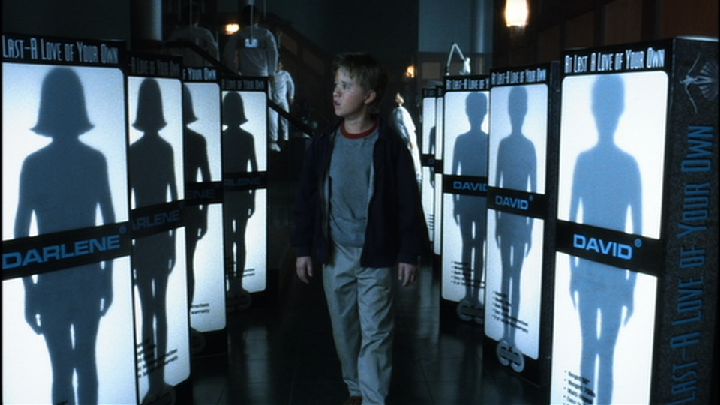
A.I., released in 2001 and directed by Steven Speilberg, sits alone on my list of favorite films as the only film that makes me weep pretty much every time I see it. It happens during the long ending when David, played by Haley Joel Osment, spends the final perfect day with his mother; it triggers within me a profound sense of sadness.
A.I. was one of Stanley Kubrick’s back-burner projects and for many years it lingered in development hell. When Kubrick died in 1999, Speilberg went ahead and made the picture, and it is exactly what it is: A.I. is film with a Kubrick foundation but made by Speilberg. It has Speilberg’s unmistakable Hollywood gloss, but that gloss is applied to a dark exploration of the human condition that is more characteristic of Kubrick’s work. It explores the themes of meaning, love and hate, death, childhood, parenthood, and it is, at its core, a deeply pessimistic film. It uses the android sci-fi trope to generate an outsider’s perspective about humanity, showing it to be short-sighted, weak, fearful, and at the end of the film, extinct.

The film opens with a voice-over narration which informs us that this is a future in which warming temperatures melted the polar ice caps and caused the oceans to rise and flood huge coastal cities like New York and Amsterdam. Many millions of people are dead or displaced, especially in the third world. In the first world, things were stabilized with robots and with population controls in the form of licensed childbirth. Then, in medias res, we are dropped into a lecture being delivered to a packed house by a professor/scientist played by William Hurt. Right away, the philosophical underpinnings of this film are opened up as the professor discusses the ethics of creating emotional robots that have the ability to love.
During this lecture, it strikes me pretty starkly that in all the talk about creating emotional robots, robots with a subconscious and an inner life, robots with the ability to dream, etc., that this world is weird, strange, off. They are openly talking about creating their own replacements. They don’t seem to be aware of it, and yet this strikes me as undeniably true, and that they ought to damned well be aware of it, but that they wouldn’t be aware of it strikes me also as undeniably true, that people follow trends and in this kind of timeline they would undeniably and compulsively work against their own long-term survival as if possessed by some sort of technological demon. In the audience at the lecture, there’s light-hearted joking around, but for me all of it sets up this almost unbearable pessimistic tone: These humans are building their own replacements, and they don’t even know it. Extinction looms in the air from the first frame of this picture.
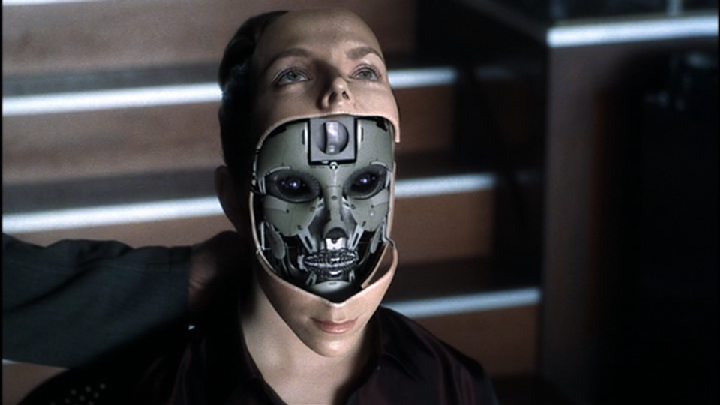
From there, the film is about David, a prototype emotional robot in the form of a child, a ten-year-old boy. David’s cognitive abilities and his personality also seem to be programmed with the aim of being appropriate for his age. He’s not all that bright, but he is inquisitive and trusting and he makes a lot of mistakes as he tries to negotiate his relationship with his parents, especially his mother, played by Frances O’Connor.
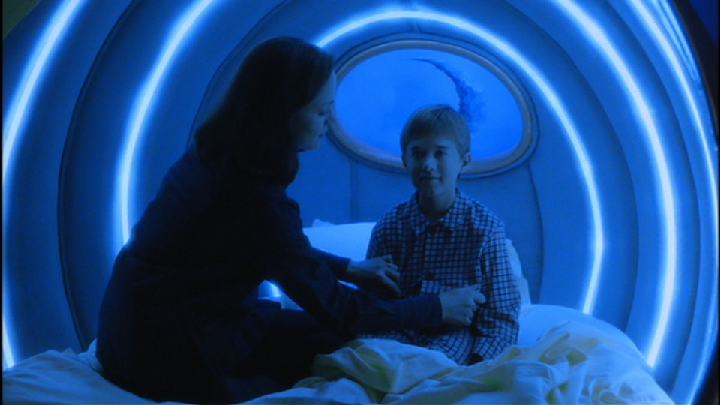
What makes David distinct from other androids is that he comes with a love chip that can be activated, or imprinted, by the android’s owner, and when this happens david “bonds” with the imprinter, his owner. David comes with instructions about how to do this. David is given to a family as a trial run; the family was chosen because their only son Martin, born one presumes under license from the state, is in a freezer. He was dying and beyond help, so doctors froze him. David, then, is a stand-in son until medicine advances enough to defrost Martin. The mother, Monica, is in a perpetual state of grief, and watching her attempt to fill her empty, grieving soul with this robot son, I’m sitting there thinking, Monica, please don’t imprint the robot. Things are going to get weird if you do it. Of course she does and David bonds to her, Martin gets defrosted and cured, and all the sudden David is a third wheel. I’ll skip the details and suffice it to say that it is wretched. It’s a slow-motion trainswreck that ends, I kid you not, with the mother abandoning David out on a country road in the woods in a scene that can only be described as gut-wrenching. It is unvarnished awfulness, and I can’t overstate it. The first time I saw this picture, I couldn’t believe what I had just seen. Did she really just drop him off in the woods like a dog that bit the baby? When she drives away, I am thinking, she’s going to turn the car around. No way she’s just leaving him.
From there, it’s a riff on Pinnochio. David, bonded to his mother, only wants to go home to her, and he reasons that if he can become a real boy, she will accept him. He goes on a quest to become a real boy. Here, it has to be said that Osment’s David is an achievement for a child actor. David is sort of simultaneously cute and creepy, and I would say certainly that Speilberg resists all attempts to sentimentalize him. Instead, Speilberg keeps David at arm’s length. David’s programming is kind of off and exaggerated, I think, like the programmers haven’t yet worked out all the bugs: It’s like one of David’s central commands is to maintain a childlike belief in Santa Claus, that being able to maintain an irrational belief is a fundamental characteristic of a child. As a viewer, this highlights that David is kind of alien and weird, uncanny, that David’s ability to learn and adapt hits this brick wall and he gets caught in a feedback loop. It keeps David at distance, so as a viewer I never really pull for David; he’s a machine, after all, and that’s a layer to this movie that I’d like to think is the reason why Speilberg keeps David a bit alien, a bit distant, that that itself calls attention to the idea that people can’t really feel the same deep connection to something that is powered-on rather than alive and breathing. In our lectures and philosophical conversations, we would like to think that the human ability to love is boundless, yet in reality it isn’t, and so it is just all the more evil, for lack of a better term, to imbue these robots with emotional lives, much less an emotional tie that only goes one way, as is the case with David.
This society is evil in the larger beurocratic sense. As I have said, it is committed to its own destruction, and it oblivious to that trajectory. When Monica imprints David, for instance, obviously she isn’t scheming to do something malignant. When she throws David away, she chooses that method of disposal because she doesn’t want David to be dismantled or harmed if she returns him to the factory. I have to admit here that that reasoning behind doing this doesn’t make any sense to me in the context of this picture in which Monica has some kind of motherly feelings for David because if she had feelings for David she would not be capable of abandoning him; giving him back to the factory to deal with is obviously the only “loving” way to deal with David. It only really makes sense to me if I look at it as a perversion of values, an inability or a confusion on the part of Monica to think things through and to act based on a recognition about what is good. Monica, in some sense, is poisoned, infected with the same disease, possessed by the same demon, that is evident in the professor’s lecture that opened the picture.
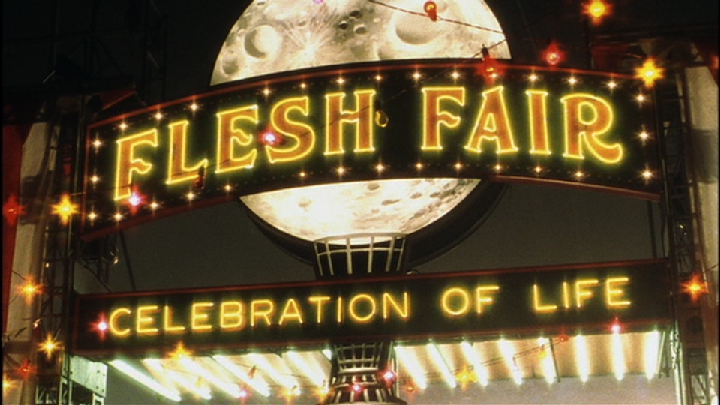
Take the Flesh Fair scene. I think a level-one surface-level read of that scene is, hey, look at these right-wing monster human’s total lack of humanity. These monsters are turning these robots into a perverse show of destruction via cartoonish acid baths and dramatic blasts out of canons. How horrid! Looking at this in the current year, 2023, I notice that Speilberg certianly is inviting the audience to take a negative view of the flesh fair, it’s attendees clad in red, white, and blue very akin to something one would see at a Trump rally, and the “celebration of life” tagline on the signage is certainly pointing a finger directly to the anti-abortion crowd. To a guy like Speilberg, these are the stupid rednecks who vote against their own interests, but from another point of view, these are the working-class people who have been replaced by robots and subjected to a authoritarian one-child law. Once you realize that, the flesh fair is actually an outburst of sanity from a society that has otherwise gone mad. As the movie states in the opening voiceover, robots are woven into the very “chainmail” of society, kind of like automobiles, and the flesh fair is the equivalent of going to the demolition derby. Plus, the machines are abominable. They are walking nightmares. Destroying them is really the only thing that makes sense.
David is the manifestation of a much greater societal sickness.
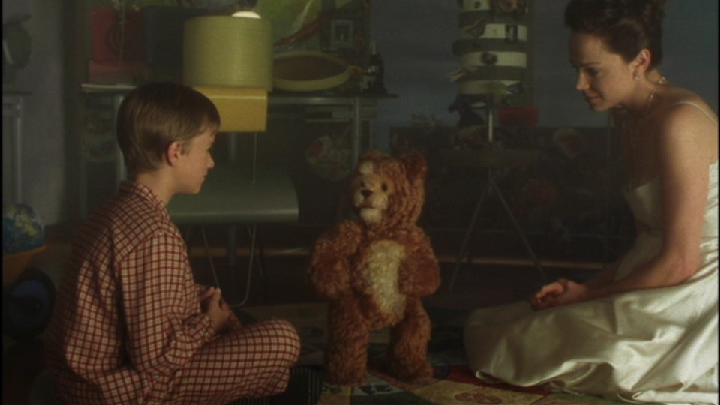
Here I must mention Teddy. Teddy is the heart of the movie, and his inclusion has just really baffled my mind in the sense that Teddy is such a pitch-perfect and necessary character, executed flawlessly. If I am not mistaken, I believe I read that people mistake Teddy for a Speilberg addition, but in fact Teddy was part of the project under Kubrick. The idea with Teddy I think is that David doesn’t have a heart, but he sort of needs one. It’s hard to connect with David’s nonsensical quest to become real, but it is easy to follow Teddy’s task keep up with David. It baffles my mind imagining the process that led to Teddy, a cute but worn-around-the-edges Teddy bear guardian angel that dispenses sensible but restrained advice using a masculine adult voice that is a little gravelly and tinny, and while David has trouble understanding even basic ideas like fairy tales aren’t real, Teddy is just there solid as a hammer and doling out solid advice like, be careful, David.
The film never specifies the year in which it is set, but I can see it being a pretty good prognostication about the year 2050 give or take a few years. As I have written this post, revised it and added to it over the past couple of days, I’ve been living with this film, chewing on it, and I keep feeling a bit creeped out about it, it’s vision of the future. It isn’t really like any other science fiction movie that I can think of because it is so grounded and plausible. Put another way, it is set in the future, but it is a highly recognizeable future. Monica and Henry’s house, for instance, seems fully contemporary upper middle class. The cars they drive seem to fit, too. Sexbots, which would undoubtedly be a driving force behind the initital adoption of androids, are accounted for, tastefully, with the Jude Law robogigolo character. The walled off upper classes. The demolition-derby deplorables. For this to be made in 2001, it is pretty damned eerily spot on in its predictions so far. As I’ve said, I think a pretty major evolution in computing must occur for something like David to become a reality, but if that evolution occurs, combined with the advances in robots, combined with how sexbots are going to undoubtedly drive forward a demand for realistic androids, this film feels not like it is making predictions so much as it is making prophesy, and I kind of want to end with that idea, that this film has the potential to blow someone’s mind watching it in the year 2050. Did these guys have a crystal ball or what? I think this film will only become more important as the years go by.